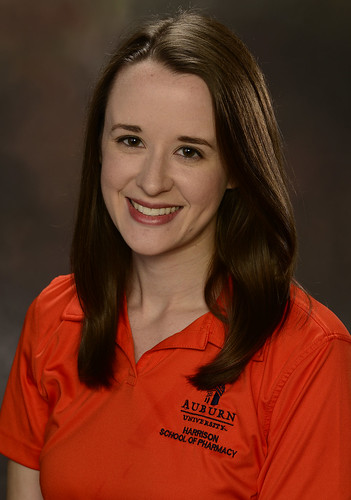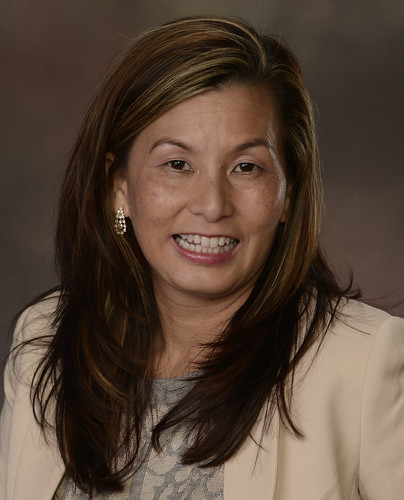Auburn University pharmacy faculty-student duo studies vitamin D in children
Article body
While a person's health care team is working hard to treat whatever is ailing them, one component that is often overlooked and possibly detrimental during the extended stay indoors is the lack of Vitamin D. The faculty-student research team of Allison Chung and Elizabeth Wood are trying to find out exactly what kind of impact that has on chronically ill children.
Wood, a fourth-year student in Auburn University's Harrison School of Pharmacy from Vestavia Hills, Alabama, and Chung, an associate clinical professor at the Harrison School of Pharmacy's Mobile campus at the University of South Alabama, are working together on a project titled "Vitamin D Supplementation in Critically Ill Children: A Prospective Trial and Dose Evaluation." Working out of Chung's practice site at the USA Children's and Women's Hospital in Mobile, the duo hopes to have the program initiated this month.
"Vitamin D is a hot topic right now and deficiency has been linked with diseases like diabetes, cancer and cardiovascular disease," said Wood. "Deficiency is also common in critically ill patients, partially due to decreased sun exposure. However, few studies have looked at the impact of giving vitamin D supplements on improving outcomes for these patients, and previous studies utilized doses that were too low to get patients to the therapeutic range of vitamin D."
Wood's interest in the topic stemmed from taking the research elective course as a third-year student. After learning about the pediatric population and how important vitamin D is, she has helped develop the project with Chung, a pediatric pharmacist.
"I give her feedback and advice on things to do, but most of the time it is all her that is really being proactive and independent with this project," said Chung. "Elizabeth has really taken leadership and ownership of this project and has made it her own."
Two grants, totaling $10,000, have been awarded to Wood to assist her in the project. The American Foundation of Pharmaceutical Education Gateway Research Scholarship is awarded to Pharm. D. students, those working toward a Doctor of Pharmacy degree, to give them an opportunity in research. Wood was also one of just two Pharm.D. students in the nation to earn an American College of Clinical Pharmacy Research Institute Futures Grant.
Vitamin D, the sunshine vitamin, is especially important for patients in a range of deficiency often caused by lack of sun exposure or low nutrients in their diet.
"Our study can help determine the best dose of vitamin D supplements to use in critically ill children," said Wood. "Depending on the results, it could also encourage regular screening and supplementation of vitamin D for this population."
As part of the study, Wood and Chung will be giving high-dose vitamin D supplements to children who are in the pediatric intensive care unit at the USA Children's and Women's Hospital. According to Wood, clinical outcomes could potentially be improved and it could be an inexpensive solution for critically ill patients.
The 30-50 participants will range anywhere from neonates, or newborns, to 18 year olds. After getting consent from the patients' guardians, the patients will be admitted into the study based on certain criteria.
When patients' levels are determined to be below 30 nanograms per milliliter, characterized as deficient in the vitamin, they will be administered vitamin D while in the pediatric intensive care unit, either in the liquid or pill form. If the patients' levels are above 30 nanograms per milliliter, they will be put into a control group and will not receive the supplement.
The blood samples will then be collected and shipped back to Auburn where the Harrison School of Pharmacy's Department of Drug Discovery and Development will run analysis for serum vitamin D levels and other inflammatory markers.
Once patients are discharged from the pediatric intensive care unit, patients' guardians will be contacted and asked various questions to assess the effects of the supplement. Finally, the participants will be brought back in to check their vitamin D levels.
For Wood, this project is just a starting point as she sees herself getting more involved in research and health outcomes in the next step of her career.
"After graduating in May, I hope to pursue a residency and eventually work in the inpatient setting, potentially with the critically ill," said Wood. "I'm really excited to be a part of a study that could shed light on an inexpensive, safe intervention for critically ill children."
Auburn University's Harrison School of Pharmacy is ranked among the top 20 percent of all pharmacy schools in the United States, according to U.S. News & World Report. Fully accredited by the Accreditation Council for Pharmacy Education, the School offers doctoral degrees in pharmacy (Pharm.D.) and pharmaceutical sciences (Ph.D.) while also offering a master's in pharmaceutical sciences. In 2014, the school adopted the slogan, "Making Medications Work Through Innovative Research, Education and Patient Care." For more information about the School, call (334) 844-8348 or go to http://pharmacy.auburn.edu.
Related Media
Related Links
Media interested in this story can contact Communications Director Preston Sparks at (334) 844-9999 or preston.sparks@auburn.edu.
Auburn University is a nationally ranked land grant institution recognized for its commitment to world-class scholarship, interdisciplinary research with an elite, top-tier Carnegie R1 classification, life-changing outreach with Carnegie’s Community Engagement designation and an undergraduate education experience second to none. Auburn is home to more than 30,000 students, and its faculty and research partners collaborate to develop and deliver meaningful scholarship, science and technology-based advancements that meet pressing regional, national and global needs. Auburn’s commitment to active student engagement, professional success and public/private partnership drives a growing reputation for outreach and extension that delivers broad economic, health and societal impact.






